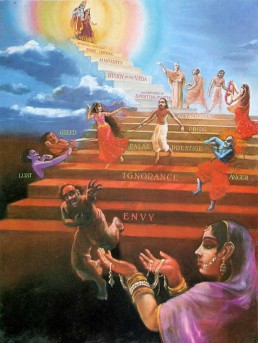According to Shankara, speculative knowledge is Jnana, and actual experience of the perfection is Vijnana. Here Krishna is promising that he would not only deliver to Arjuna the theoretical explanation of the Art of Divine Life, but also, during the very discourse, take him to the highest peak of Self-rediscovery. This may look rather unbelievable but unlike Yoga and other types of philosophies in India, Vedanta is not an indirect process, inasmuch as, after the study of this Shastra, it is not necessary for A FIT STUDENT to retire into the jungles to practise and bring the experience of perfection into his cognition.
During the very discourse, if the student is mentally fit to walk along with the teacher step by step and follow carefully the logic and significance of his explanations, he can gain glimpses of realisation during the very hours of his study. It is because of this that Vedanta is taught only to a student who has been made fit for this flight to the beyond. If an individual student is perfectly integrated inwardly and if he can continuously maintain his adventurous thirst to experience the Reality, then he, in his attempt to identify himself with the thought and the spirit of his teacher’s discourses, can ultimately come to revel in the experience of the very goal that is indicated by Vedanta. Self-realisation is instantaneous, during the study and understanding of scriptures, gained through the teacher-taught discussions.
IF VEDANTA IS THUS A COMPLETE SCIENCE, AND THE EXPERIENCE OF THE DIVINITY OF THE SELF CAN BE HAD EVEN DURING THE VERY TEACHER-TAUGHT DISCUSSIONS, HOW IS IT THAT SELF-REALISED MASTERS ARE SO RARE IN THE WORLD? LISTEN:

